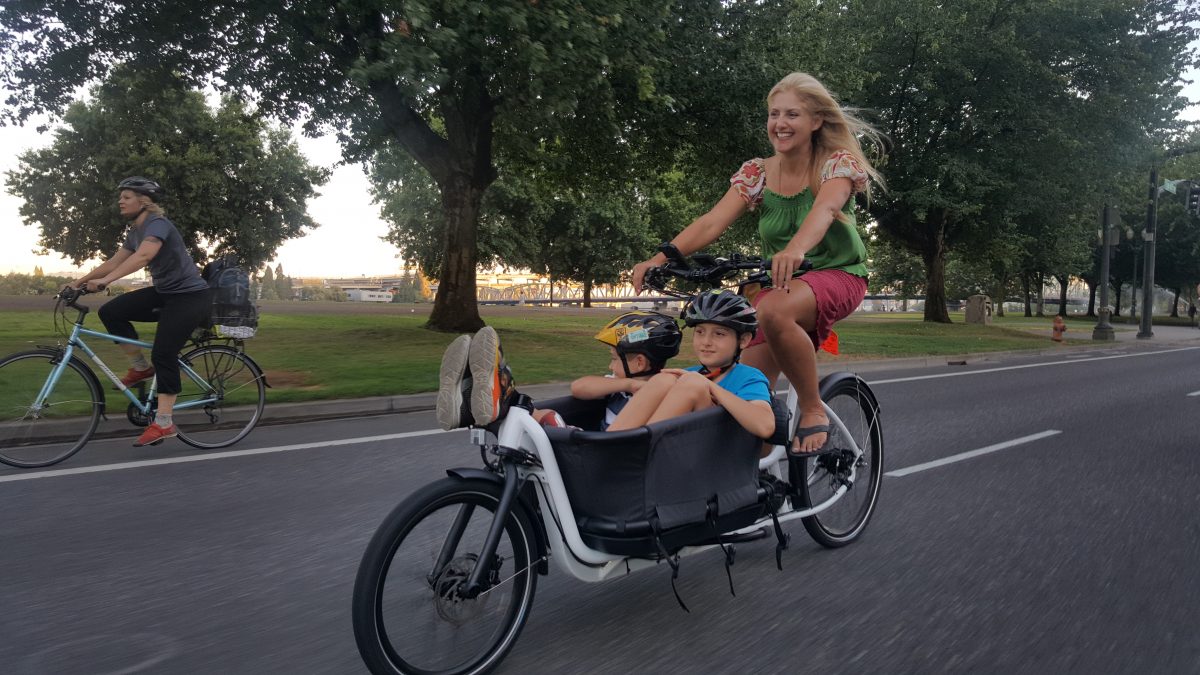
(Photo: Cory Poole)
Last week’s profile of the carfree Kurten family sparked some great comments about e-bikes. In the near future, I’ll write about various types of e-assists, where to test ride, rent, buy, and have them serviced. But today I’m going to write about the opposite: not having an e-bike.
I got the impression some readers think it’s impossible to be a carfree family without an e-bike and I’d like to counter that it is possible, plus I’m not the only one doing it. However, it’s not for everyone, which is exactly why e-bikes — and e-cargo-bikes in particular — are so amazing for families who want to live car-lite or carfree.
I’m nothing special, but I have spent a decade working towards my current status of being carfree with 150 pounds of kids. Read how I’ve carried my kids by bike for the past 10 years and you’ll see I’ve been biking with my kids since they were tiny and totable. I was able to ever-so-gradually build muscle, confidence, and stubbornness; and the kids were able to grow up learning getting everywhere on bikes is an ordinary thing. Babies and toddlers are so little, light, and portable, and many conveniently grow into kids who will ride their own bikes right around the time they become too hefty to carry easily. Before e-assists were commonly available (I didn’t even know there was such a thing when I upgraded from my regular bike to a cargo bike seven years ago), I followed in the footsteps of the biking families with kids older than mine:
➤ Parent carries kid(s) for as long as possible, weight- and size-wise.
➤ Kid(s) ride their own bike(s) if the roads/distances are kid-friendly enough, or
➤ The family switches to using a tandem bike or two.
In countries where “8-80” bike infrastructure is a reality, tandem bikes aren’t part of the family biking trajectory, but in a pre-e-assist America, they sure were. One thing parents noticed as they graduated from limo driver to bike train leader is that their range drastically decreased, and that is something e-bikes have done away with.
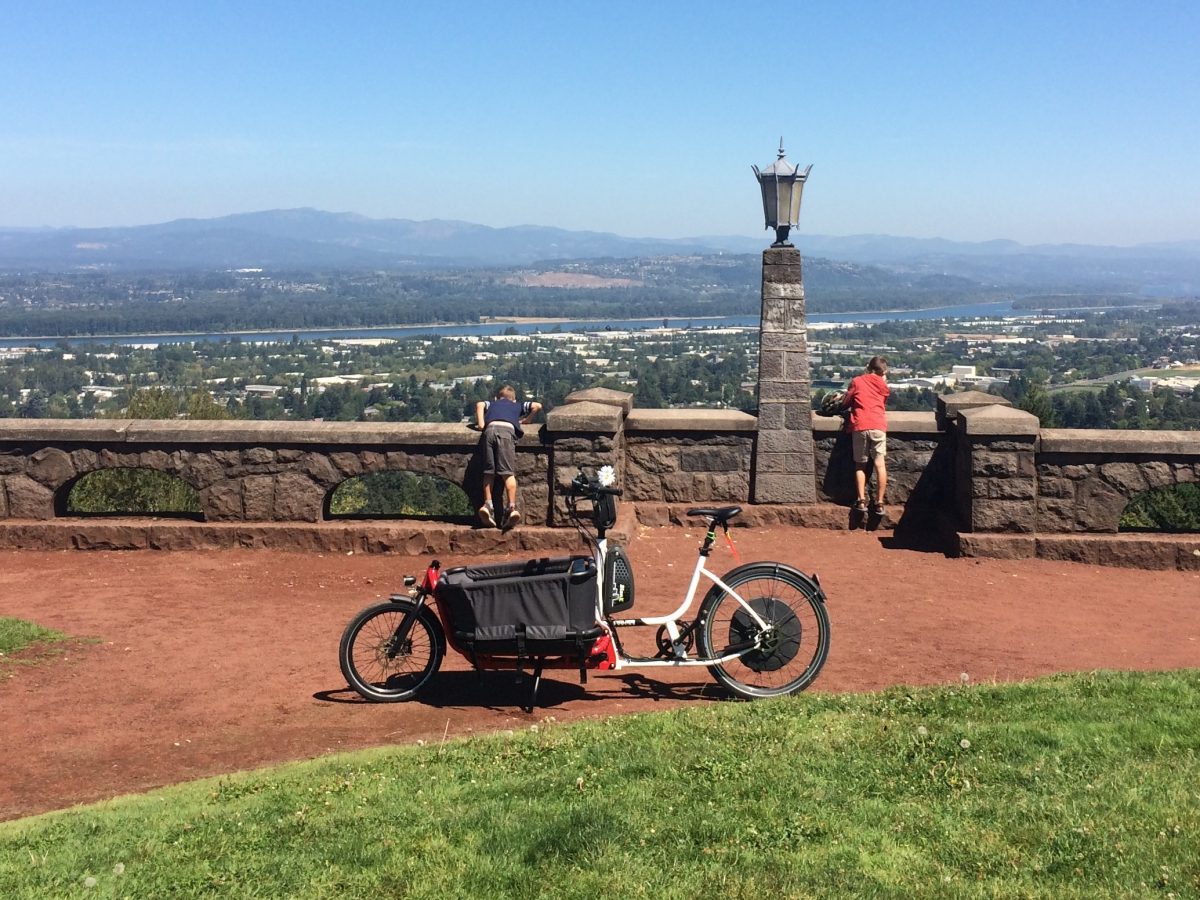
(Photo: Madi Carlson)
In addition to the years of experience with wee cargo, I’ve always preferred to live hyperlocally and that plays well with not having an e-assist. Before moving to the Pacific Northwest and having kids, I lived in San Diego. I liked how self-contained my neighborhood of Pacific Beach was: I rode my beach cruiser to everything — grocery stores, library, doctor, dentist, beach, bars, friends’ houses — except I drove 10 freeway miles to my two jobs in Sorrento Valley. That love of biking to things close to home was always there and has only grown over time.
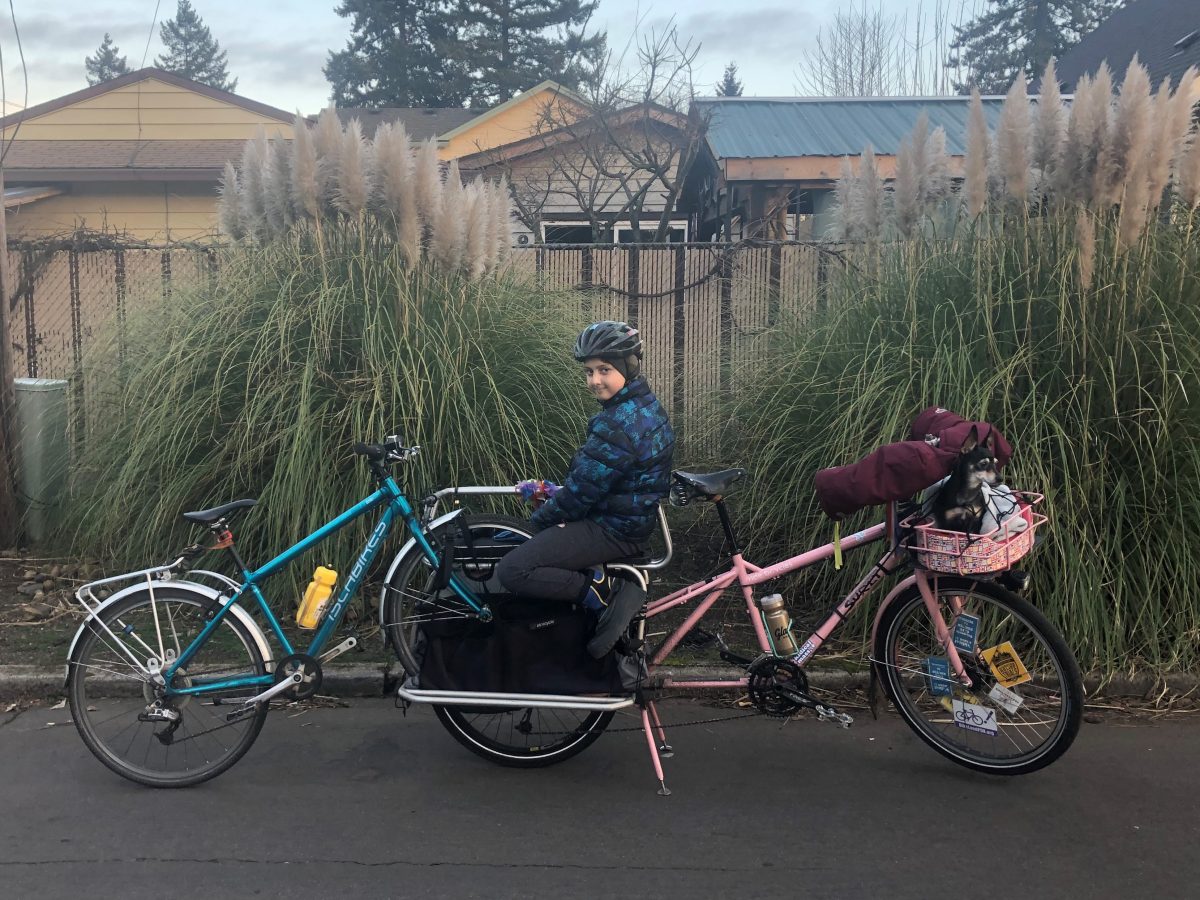
(Photo: Madi Carlson)
Like Pacific Beach, Portland is well-suited to getting around by bike. We don’t live close-in, the closest we could get was between Woodstock and Mt. Scott, but it’s flat out here! Having moved here from hilly Seattle (also good for biking, but not as good as here), it’s a dream. My children attend neighborhood schools, which last year meant I biked one flat mile there and one flat mile back twice a day to escort them both to the same elementary school, but this year the two-school commute has me biking 20 flattish miles each day. And while they’re at school I mainly work from home, though sometimes from coffee shops, and sometimes out of the house leading bike tours.
Advertisement
For me, it really comes down to the fact that I don’t have an e-bike because I haven’t replaced a car. Caveat: I’m currently able-bodied and capable of getting around with pedal-power alone, carrying one or two kids on occasion, but I know that won’t always be the case and I fully expect to invest in an e-assisted cargo bike if and when any of the three of us becomes less able-bodied because I don’t ever want to own a car again. But in the meantime, I’ve been able to set myself up with a bike-based life rather than a car-based life. What exactly does this mean? Well:
The bike-based life
➤ Things are not car distance away or timed such that the distance must be traversed at car speed.
➤ Therefore, my backup plan does not need to be a car.
➤ If my bike were to break, or were myself or one of the kids unable to bike, we would not be stuck with our only alternative being a car of some sort (rental, taxi, ride from friend).
➤ Walking and busing are options for all our destinations and our bikes simply make things quicker, easier, and a lot more fun.
Obviously, I’m privileged that I can live such a life. Not everyone can live like this, and not everyone should live like this. I like to think when people see us biking around as a family, whether or not they can see my bike doesn’t have an e-assist (which is never a mystery if I’m on even the smallest incline) a seed is planted and they’ll wonder if they can’t bike or walk more, too.
What are your thoughts on e-bikes? Has your thinking changed over time? I’m relieved that fewer people (though one commenter last week) think of e-bikes as “cheating” these days. Thanks for reading!
Remember, we’re always looking for people to profile. Get in touch if that sounds like fun. I’d especially like to feature families of color so please get in touch or ask friends of color who bike with their kids if they’re interested in sharing their stories. And as always, feel free ask questions in the comments below or email me your story ideas and insights at madidotcom [at] gmail [dot] com.
— Madi Carlson, @familyride on Instagram and Twitter
Browse past Family Biking posts here.
Never miss a story. Sign-up for the daily BP Headlines email.
BikePortland needs your support.






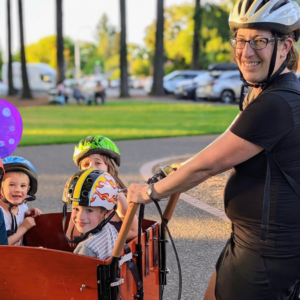
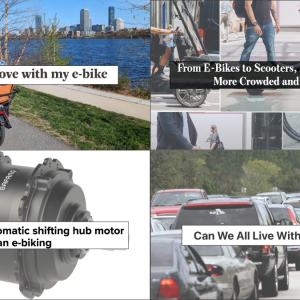
Thanks for reading.
BikePortland has served this community with independent community journalism since 2005. We rely on subscriptions from readers like you to survive. Your financial support is vital in keeping this valuable resource alive and well.
Please subscribe today to strengthen and expand our work.
I rode a Big Dummy for years and used the heck out of it for grocery shopping and taking our son to preschool 3 times a week as well as taking my business orders to the post office and running deliveries. Years later the kid now rides his own bike, but the daily transportation of heavy boxes to USPS, grocery shopping and assorted errands started to take their toll on my then-50-year-old knees and my barely hanging in there achilles tendon. 30 years of bike commuting was making itself felt.
We’re a 1 car family and I started to feel bad for relying on our one car more and more. I actually started to look at Craigslist to see what used Nissan Leafs were going for when I thought “What am I thinking? I should get an e-bike!” We now have a sweet Xtracycle Edgerunner.
20 years ago electric add-ons for bikes started to appear and I’m quite sure my first reaction was to be a snob about them. But when e-bikes started to really happen 10 years ago or so, I took a more macro view and started to see them as a great way to keep cars off the road and build alliances with people who wouldn’t otherwise ride. The ableist, ageist, and yes, toxic masculinity objections are pretty disturbing but it’s great to see that people are getting called out on it. https://www.bikebiz.com/community/copenhagenize-slams-ebikes
It’s been amazing. The car now stays parked much more and my knees and achilles have improved. I’m pretty stoked! Thanks to Barb and Joel at Splendid Cycles!
I have an e-assist Big Dummy from Splendid (I am too tall for any of the “one size fits all” e-bikes. Great bike, and great shop. It really extends our range as a family, and enables us to replace more car trips every week.
Mostly I think we need to resiste the urge to reify the idea that the variant with a motor is the real thing, and—as the title of your excellent piece suggests—we all secretly or not so secretly want one, will eventually graduate to one.
A bike with pedals and no motor is, and has for more than a century been, a ticket to freedom, movement, access, jobs, commerce, fun. The e-thing will come (has arrived) and it will go again, like so many other ‘advances.’
E thing will come and go? You haven”t heard of the hovercycle? Destined to become a gotta-have for urban hipsters.
31% of bikes sold in the Netherlands in 2018 were e-bikes (up from 29% in 2017).
Apparently, the Dutch believe bikes with a bit of lithium and a solenoid are real bikes.
I am well aware of this., and am not now nor do I plan in the future to be basing my statements on popularity, consumer demand.
The dim future prospects of the almighty auto, as we have discussed here in the past, won’t, in my view, come about because of a decline in consumer demand but because constraints force a reboot.
“…are real bikes.”
You may have misunderstood my meaning. By “the variant with the motor is the real thing” I meant what I’ve now heard countless times, which is that we can now recognize that the mere bike was but a stepping stone to what we now know to be its apotheosis, namely the one with the motor.
Akin to the renter being only partway there, but when he finally manages to buy a house he has become fully adult.
I understood your meaning…but I still view the integration of a small electric motor as just another modest advance in bike technology like alloy wheels , pneumatic tires, the bike chain, derailers, index shifting, and disc brakes.
Interesting.
I see the addition of a motor as a categorical change, and so do our laws. It isn’t as if anyone felt the need to change the classification of bikes when disc brakes or pneumatic tires were added.
Is a moped then more like an ebike to you than it is like a motorcycle? The ones the cool kids had when I was growing up had pedals. I never quite understood why, but they did propel the vehicle when they ran out of gas or had fouled the spark plug.
“I see the addition of a motor as a categorical change, and so do our laws.”
Actually no. https://www.oregonlaws.org/ors/814.405
And regarding this comment: “The e-thing will come (has arrived) and it will go again, like so many other ‘advances.’” So are you suggesting that ebikes are a doomed fad rather than a trend? Care to place a wager on that?
From that link: “except when otherwise specifically provided by statute” I thought we had seen some examples of these. You tell me.
“So are you suggesting that ebikes are a doomed fad rather than a trend? Care to place a wager on that?”
Remember Sandy, when people were scrambling to charge their phones?
https://bikeportland.org/2012/11/01/while-sandy-recovery-continues-signs-of-hope-on-two-wheels-79511
Sandy was just the preview of the movie we’re going to be living. What we need are resilient, cheap, durable, everyday solutions for the future we know is coming. An ebike is an expensive, complex, and tightly coupled interpretation of the bicycle, which is the quintessentially resilient (and in Ivan Illich’s phrase ‘convivial’) technology.
Reasons number 5 and 6 that I haven’t converted my primary bike to e-
*it would turn a smoothly running drive train into a piece of kludge. . .
*. . .that will seriously slow me down when the battery eventually goes dead. Or of course, when the Big One takes out the power grid.
The vast majority of e-bikes sold will not move unless muscle power is used to push pedals. I consider these bikes to be bikes. When assist is no longer required I think there is a good argument that a category change has occurred. I’m OK with calling bikes that can move via throttle adjustment alone mopeds or scooters.
Neither will cars.
😉
The heart of the article:
➤ Things are not car distance away or timed such that the distance must be traversed at car speed.
➤ Therefore, my backup plan does not need to be a car.
I wish I could limit my travels to (my) biking distance. Unfortunately, I’m going to have to regularly visit a parent in a care facility in Bellevue, WA. There appears to be no transit anywhere nearby.
I agree that that was the heart of the article. Many people never consider such things when they decide where to live. (Yes, some folks still have an actual choice of locations to call home.)
My Tuesday ends at a ballet studio that happens to be along the longest bike path system in Eugene (where I happen to live). As I was playing with one granddaughter during her sister’s class, a woman described her post-work driving around to my wife. We both interpreted her story identically: that this woman felt that rushing around in a car made her feel alive and important.
We chuckled at ourselves as we realized that if we would have described our afternoon of riding around with five- and six-year-olds, she might have said that our cycling makes us feel alive and important, and she would have been correct.
ummm…e bikes has been around for more than a century and share similar history with regular bicycles:
https://en.wikipedia.org/wiki/Electric_bicycle
https://compostpedallers.com/compost/history-electric-bicycles
Will they come and go? Well, last year accounted for a 78% increase in sales while regular bikes have decreased. Ebikes has yet to see a decrease in year to year sales.
https://www.bicycleretailer.com/studies-reports/2019/01/28/2018-wholesale-bike-sales-down-10-units-4-units?utm_source=Bicycle+Retailer+Newletters&utm_campaign=353033e15d-EMAIL_CAMPAIGN_2019_02_04_01_54_COPY_01&utm_medium=email&utm_term=0_bbd0ac46d2-353033e15d-29073119#.XFjcSlxKjmE
I’m not for or against ebikes, but read data and stats are hard to argue with.
“I’m not for or against ebikes, but read data and stats are hard to argue with.”
I am well aware that the market for e-things is on fire. Capitalism is like that.
My point has never been to argue with consumer preferences but to posit that other forces will take over (I say sooner, others feel later, but either way the point is that we who like to buy goodies won’t always be in the driver’s seat).
Ebikes are vastly more complicated, fragile, tightly coupled to things like the grid, battery replacement supply chains, availability of rare metals, etc., and I consequently foresee them being far more vulnerable to foreseeable future disruptions than good ol’ bicycles.